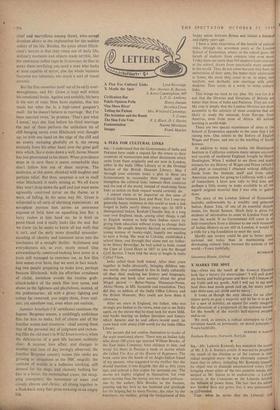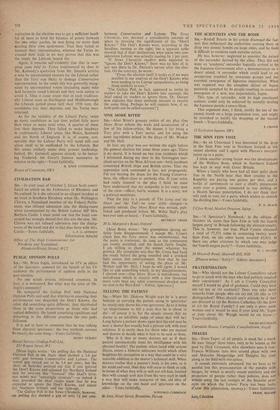SIR,--Mr. Ludovic Kennedy has mistaken the nature of Mr. J.
E. S. Simon's article. It was not to prophesy the result of the election or of the contest in indi' vidual marginal seats—he was obviously content to leave that to others, including Mr. Kennedy himself. Its object was to dissuade uncommitted voters fronl bringing about either of the two possible results that seemed to Mr. Simon to be undesirable—a Labour majority in the Commons or the Liberals holdinfl the balance of power there. The fact that his advice was heeded does not prove that it was unnecessary or ill-founded.
Thus when he wrote that the Liberals' real aspiration in the election was to get a sufficient hand- ful of seats to hold the balance of power between the two other parties, he was doing no more than quoting their own spokesmen. That they failed to increase their representation, whereas the Tories in- creased their lead, in no way proves that this was the result the Liberals hoped for.
Again, it remains self-evidently true that in mar- ginal seats held by Tories (represented by dots in Mr. Kennedy's quotation from Mr. Simon's article) a vote by uncommitted electors for the Liberal rather than the Tory was likely to damage Conservative representation. In the result this was generally recog- nised by uncommitted voters (including many 'who had formerly voted Liberal) and they took action to avoid it. Thus it came about that in such tradition- ally Liberal seats as Darlington and Middlesbrough the Liberals polled about half their 1950 vote, the candidates lost their deposits, and the Tories were returned.
As for the viability of the Liberal Party, twice as many candidates as last time polled little more than twice as many total votes. A quarter of them lost their deposits. They failed to make headway in traditionally. Liberal areas, like Wales, Scotland and the North of England. It is, of course, con- ceivable that the Labour Party will stand still and allow itself to be outflanked by the Liberals. But this seems unlikely under their present leadership. Indeed, Mr. Gaitskell appears already to be imitat- ing Frederick the Great's famous manceuvrc in echelon to the right.—Yours faithfully,







































 Previous page
Previous page